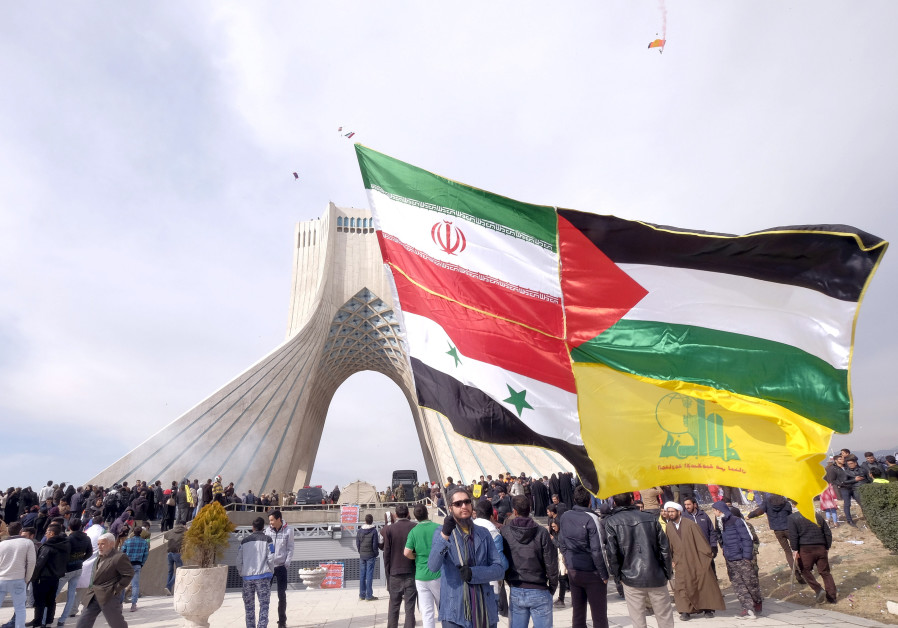Soltan-Shahi was described by MEMRI in 2018 as secretary-general of the Organization for Aiding the Islamic Revolution of the Palestinian People in the Office of the Iranian Presidency.
Seth J. Frantzman

Iran’s Tasnim News ran a long and important interview on Tuesday with a Palestinian named Ali Reza Soltan-Shahi. The interview is interesting because it gives a window not only into Palestinian thinking, but particularly because of the views it conveyed to the Iranian regime.
Soltan-Shahi has appeared before at Iranian events. Last year, he was described by MEMRI as secretary-general of the Organization for Aiding the Islamic Revolution of the Palestinian People in the Office of the Iranian Presidency. Tasnim describes him only as a former head of the Palestinian Center for Mental Health.
The interview begins with a discussion of the Israeli political parties that ran in the recent election. Soltan-Shahi says the 2019 election was the culmination of a process that began in 1977 and has seen the entrenchment of Likud and the Israeli right. He notes that Labor and Meretz have fallen in their number of seats, and describes Israel as being more fundamentalist and religious – an irony considering that the Iranian regime is a fundamentalist theocracy.
He argues that the Israeli Right will gain more power in the future, and that while Prime Minister Benjamin Netanyahu will successfully form a new government, his “popularity is at the lowest level internationally. Those countries that interact with the Zionist regime, such as the Europeans: their interaction is at its lowest.” He says that Israel’s main ally is the United States and the administration of US President Donald Trump.
The interview notes that the privileges Israel enjoys in its relations with the US have made Israel’s policies more efficient, pointing to US recognition of Jerusalem and the Golan. What does this unprecedented Israel-US coherence in policy mean going forward? He notes that due to the flexibility the US is showing in terms of more imaginative peace process concepts, tensions will increase in the West Bank and Gaza, which he refers to as the “occupied territories.” Unpredictability will increase and the “resistance may be strengthened.”
Israel is also seeking to “strengthen its relations with Arab countries, and as far as possible make these relations more explicit and clear.” Israel is helping to cement an anti-Iranian alliance even as Iran’s role in the region increases. Soltan-Shahi calls this Iran’s “strong presence.” The interview does not point to direct confrontation between Israel and Iran, but rather to Washington encouraging the US to be more tough on Tehran financially. “The Zionist regime will certainly use anti-Iran countries in the region, including Saudi Arabia.”
Soltan-Shahi then discusses the differences between Iran’s view and that of Europe. While European powers support a two-state solution and Israel withdrawing to the 1967 borders, “they are by no means like us, who demand the complete destruction of the Zionist regime.” Iran and Europe can only cooperate insofar as Iran seeks to highlight Israel’s abuses of international law and violation of international norms, the interviewee says. He indicates such examples as using UNESCO against the Jewish state.
What about the rumors of an “Arab NATO” which would oppose Iran? Soltan-Shahi says that experience shows that the Arab NATO has not worked well. Egypt, for instance, did not agree to be part of it. “It shows that the Arab countries, which have the most secret relations with the Zionist regime, cannot actually bring Zionists against the Islamic republic of Iran.” In short, many Arab countries in the region are unwilling to make their relations with Israel public, because they know such relations are unpopular at home and will cause protests against their rulers.
The interview ends with discussions of whether Trump will be re-elected. “The Jews in the US are financially, politically, economically and media-wise very influential, but it should be borne in mind that even as the Jews are powerful in the US, the political system is rooted in four-year terms for the presidency.” Soltan-Shahi says that if Trump is re-elected, it would mean the US has changed a lot in the last four years.
The interview is interesting because this is the kind of information that Iranian media wants to highlight – and also what some Iranians read in Farsi. The knowledge of the goals of Israel and the current Israeli government, including the complexity of coalition politics, are laid bare.
In general, the interview seems to suggest that while Israel has cemented its power and relations with Arab states, as well as gaining from Washington’s policies, it is unable to take things to the next step. This is because, in the view of the interview, the Arab states will not ever actually form a real alliance with Israel. It is an alliance of convenience. With that knowledge a sophisticated regime like Iran’s can continue to insert itself into the politics of Iraq, Syria, Lebanon, Yemen and beyond.
The interview also points to unpredictable Palestinian responses to any kind of US “deal of the century.” Defeated militarily, the Palestinian “resistance” has less options. But, isolated, it may be unpredictable. This is an important point because the US is pushing a deal that is reportedly in line with Israel’s interests and it is unclear how the Palestinian Authority and Hamas in Gaza will react.
The astute Iranian regime reads the prevailing winds in the region carefully. It correctly understands that, while the European powers may be critical of Israel in some international forums, only Iran really seeks the destruction of Israel. Tehran seems to understand that this cannot be achieved by direct confrontation either. Interviews like this point to what information the Iranian regime is receiving and propagating.
Content retrieved from: https://www.jpost.com/Middle-East/Palestinian-to-Iranian-media-Israel-is-stronger-future-unpredictable-587656?fbclid=IwAR0xGxhz9thaSJl2hJwljN5_Mi54l2nafjm8z-JWMuL3ZBS46ccMUz_twKU.